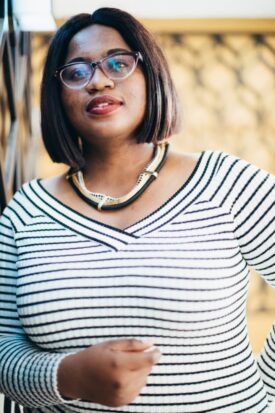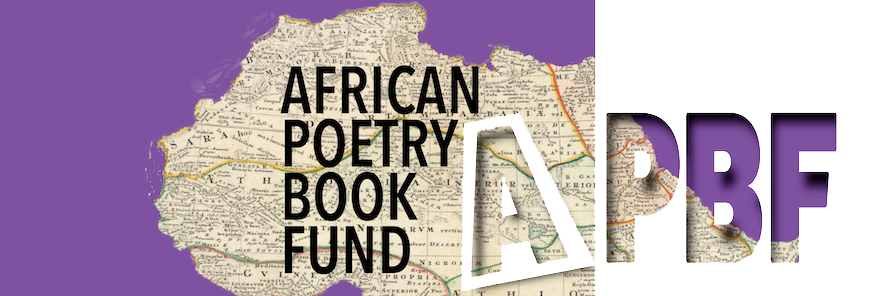Chapbook Chats: Tryphena Yeboah Interviews “Speaking in Code” Author Phodiso Modirwa
To celebrate the launch of the latest in the New-Generation African Poets Chapbook Box Set series, Tisa, Tryphena Yeboah, is talking to poets whose chapbooks are included in New-Generation African Poets: A Chapbook Box Set (Tisa). This series continues with a conversation between Tryphena and poet Phodiso Modirwa. The interview was conducted via email and has been lightly edited for publication.

Tryphena Yeboah: Congratulations on being selected as part of the 2023 New-Generation African Poets series! What a wonderful time for you, and a tremendous contribution to the growing body of African poetry in the world. What are your thoughts and feelings about this news?
Phodiso Modirwa: Oh my goodness thank you so much! I feel so honored to have my work accepted and published. This feels greatly affirming. I have been following the work of poets whose chapbooks have been included in the New Generation African Poets project over the years, whose work has given me permission to write and the confidence to send my work out there. Reading the preface Tsitsi Jaji generously wrote had me in tears; because you write, but hardly do you look back to describe your work, to speak of it, and to have someone you admire speak so graciously about what you have done is truly a joy. As for the cover work, for the whole collection, such beauty, such elegance, such an honor by Victor Ekpuk. I could not ask for more, I am still reeling from how magical this moment feels.
TY: Speaking in Code interrogates fatherhood and identity, love and trauma, religion and deception as well as silence and the possibilities of language. What drew you to these themes and how would you describe your experience reflecting and wrestling with these subjects?
PM: I was raised Christian and I still am, although my politics of religion and faith have since evolved. I also have a complicated relationship with my father. Although I’d like to consider this chapbook not autobiographical, the work is very much paralleled by my own experiences. I’m also interested in the subliminal of everything taught as true. As a child, a believer or as part of a country governed by any particular leadership, when we’re told a Bible story, a childhood lesson, history, what is left out? What are we missing while fixated on the literal?
Identity is also one of those themes that always comes up in my work because I am fascinated by the people we become when we are out in the world. I recognize my different selves when dealing with friends, colleagues at work, and my family at home. It feels performative to be these different selves but it is also self-preservative, at its best it is adaptation born from an inherent need to belong. When the day comes to a close though, which one of the many is really me? Am I really the person I portray myself to be and why do I care to be perceived a certain way? I do not have answers to these questions and I believe this is why I always return to them. I’d also say, as an introvert who spends a lot of time observing and so is sensitive to slight changes in moods, voice variation, and the likes, my very existence feels like an attempt at deciphering codes, and that comes out in my work.
I recognize my different selves when dealing with friends, colleagues at work, and my family at home. It feels performative to be these different selves but it is also self-preservative, at its best it is adaptation born from an inherent need to belong.
Phodiso Modirwa
My experience reflecting and wrestling with these subjects when writing has been bittersweet. I feel most fulfilled when I’m able to name a feeling or observation. So when the poem is finally on the page, when I feel I’ve tinkered with it enough and it is close to what I intended to say, I feel I have done my duty as a poet. But before that, there is a heaviness that comes with choosing what to put on the page, what to let wander into the world by itself. Sometimes it feels like I’m just out here telling my business unprovoked because of how much of myself is invested in the poems even if they are not personal. So I’m constantly reminding myself to be objective, to give my work life without completely taking away mine. I want to add though, that most times, I don’t know how the poem will end, where it will lead me, I am led by my curiosity to, as Ocean Vuong puts it,’ Widen [my] theatre of wonder’.
TY: I would love to hear about the process of constructing your chapbook. How did you conceive of ordering the collection? Did you discover or build any particular writing habits over the time you spent creating these poems?
PM: So while preparing for my final exams for my accounting qualification, I received the invitation to submit a manuscript. At that point, I had a couple of poems I’d worked on at the Art Residency Centre, here in Gaborone. Understanding that I have to send in my best work yet, within the tight deadline of just two weeks, I went back to those poems to see which ones had a kind of thread running through them. From there I went on to warm up my engine by reading poets like Vuyelwa Maluleke, Patricia Smith, Danez Smith, Jericho Brown and a couple more, just to help me get back to writing again. I was so lucky to have Tjawangwa Dema‘s consistent guidance to write what I know and to be secure in my own style of writing. Eventually I had a manuscript of around twenty eight poems, from which seventeen were included in the chapbook. Through Kwame Dawes and Chris Abani‘s editorial feedback, I got direction on a working order of the poems which was so enlightening because looking at the arrangement now, I do not see any other way that it could have been best arranged.
I started writing poetry just as a hobby, not realizing it was my way of navigating my world of childhood, adolescence and womanhood.
Phodiso Modirwa
TY: As a selectee for this year’s new generation series, you have become part of the APBF African poets “family”. What does it mean to be part of a growing body of contemporary poets emerging from the continent?
PM: I am truly ecstatic for the future, for what this means for me just as a person then as a poet. This for me says, my voice, my style, my stories, matter and they deserve space next to other greatly talented and dedicated poets. I started writing poetry just as a hobby, not realizing it was my way of navigating my world of childhood, adolescence and womanhood. My poetry has not moved away too much from my own personhood and to have it recognized and accepted is such an affirming nudge forward. I’m looking forward to seeing what other poets, in this new found family, are doing. I’m happy to be here.
TY: What does being an African poet mean to you?
Being an African poet to me—I have to think about it–I guess because when I’m writing, I don’t write as a Motswana poet, or as one assuming a particular identity because of locality, I don’t immediately know what it means. But looking at myself back in the days when I started seeking out poets and their work, being an African poet now to me means I am doing something worth a listen. That someone someday will find my work and in that find themselves, assert their agency to write their own stories and clear a path for others coming after. I used to be incredibly insecure in my poetry because most of the poetry I grew up exposed to was overtly African, exuded much pride in African history and identity, while my poetry seemed to tackle micro issues, girlhood, family and that, but right now, I’m confident in being a reference point to say, African poets also write poetry that looks like this.
TY: Your first chapbook is out in the world and I hope this is not too daunting of a question to ask, but I’m eager to hear what projects you’re currently working on and if you have any exciting works in the pipeline?
PM: Yes, this is daunting haha! But, I am currently writing a full length collection that explores the different ways young girls/women are prepared for marriage. I’m interested particularly in Setswana culture, ceremonies, and conversations with aunts, strangers and marriage counselors, what’s said, what’s left out and what that means. Of course I’m still in the thick of it so the collection might take a different direction but that’s what I’m currently working on.
Phodiso Modirwa is a writer and poet from Botswana. Her poetry and non-fiction has been published in 20.35 Africa: An Afroanthology of Contemporary Poetry, Brittle Paper, The Weight Of Years: An Afroanthology of Creative Nonfiction, Praxis Magazine, Jalada Africa: Bodies, Kalahari Review, Ake Review, The Rising Phoenix Review and elsewhere. She is a recipient of the Botswana President’s Award for Contemporary Poetry (2016) and recently completed a residency at the Gaborone Art Residency Centre.
Tryphena Yeboah is a Ghanaian writer and the author of the poetry chapbook, A Mouthful of Home, selected by the New Generation African Poets Series. Her fiction and essays have appeared in Narrative Magazine, Commonwealth Writers, and Lit Hub, among others. She is currently a Ph.D. student at the University of Nebraska-Lincoln, studying English with an emphasis in Creative Writing
